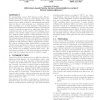Free Online Productivity Tools
i2Speak
i2Symbol
i2OCR
iTex2Img
iWeb2Print
iWeb2Shot
i2Type
iPdf2Split
iPdf2Merge
i2Bopomofo
i2Arabic
i2Style
i2Image
i2PDF
iLatex2Rtf
Sci2ools
EDBT
2008
ACM
2008
ACM
Design of PriServ, a privacy service for DHTs
By decentralizing control, P2P systems provide efficient, scalable data sharing. However, when sharing data for different purposes (e.g., billing, purchase, shipping, etc.), data privacy can be easily violated by untrustworthy peers wich may use data for other purposes (e.g., marketing, fraudulence, profiling, etc.). A basic principle of data privacy is purpose specification which states that data providers should be able to specify the purpose for which their data will be collected and used. In the context of P2P systems, decentralized control makes it hard to enforce purpose-based privacy. And the major problem of data disclosure is not addressed. Hippocratic databases provide mechanisms for enforcing purpose-based disclosure control within a corporation datastore. In this paper, we apply the Hippocratic database principles to P2P systems to enforce purpose-based privacy. We focus on Distributed Hash Tables (DHTs), because they provide strong guarantees in terms of access performanc...
| Added | 08 Dec 2009 |
| Updated | 08 Dec 2009 |
| Type | Conference |
| Year | 2008 |
| Where | EDBT |
| Authors | Mohamed Jawad, Patricia Serrano-Alvarado, Patrick Valduriez |
Comments (0)

